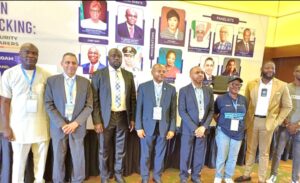
Joyce Mmereole 0koli
Nigeria’s maritime sector may face a significant decline in foreign ship traffic due to prolonged detention of vessels and their crews when drugs are discovered on board, industry experts have warned. The call for a more balanced approach was made at the Maritime Security Providers Association of Nigeria (MASPAN) and Alumni of Maritime Academy of Nigeria, Oron (AMANO) 2024 Conference, held under the theme “Drug & Human Smuggling/Trafficking: The Evolving Maritime Security Threats to Ships and Seafarers.”
Speaking at the event, Mr. Suresh Prabhakar, Director of Operations at Pacific Basin Shipping Limited in Hong Kong, urged Nigeria, particularly the Nigeria Drug Law Enforcement Agency (NDLEA), to adopt practical measures akin to those practiced in the USA, Europe, and Brazil to avoid unnecessary delays that can have severe consequences for ship crews, their families, and shipowners.
“Invariably the crew are found innocent and the vessel and crew are allowed to sail without delay. On the rare occasion that the authorities strongly suspect that a particular crew member may be involved, they land that individual and allow the ship and her remaining crew to sail without delay.
“The same practice happens in Brazilian ports when the federal police and associated agencies find drugs on board ships. This is particularly important to note as today the maximum quantity of drugs being smuggled on board ships is from Brazilian ports. When I visited Santos, Brazil in February 2024 to meet with several regulatory authorities on the topic of drug smuggling, their rationale behind this approach was clearly explained.”
Prabhakar highlighted the increasing risk posed by drug smuggling cartels and the associated security challenges faced by maritime professionals. He emphasized the importance of prompt investigation and resolution when drugs are found on board, similar to the practices in countries like the USA, Canada, and Brazil. In these regions, authorities swiftly determine the involvement of the crew, often clearing the innocent and allowing ships to continue their voyage without significant delay.
“Invariably, the crew are found innocent, and the vessel and crew are allowed to sail without delay,” Prabhakar stated. “On the rare occasion that authorities suspect a particular crew member’s involvement, that individual is detained while the ship and the remaining crew are permitted to sail.”
This practice is particularly relevant in Brazilian ports, where drug smuggling incidents have become increasingly common. Prabhakar noted that Brazilian authorities’ rationale for their approach was made clear during his visit to Santos in February 2024, where he met with federal police and regulatory bodies.
The conference also featured remarks from Nigeria’s Minister of Marine and Blue Economy, Adegboyega Oyetola, who was represented by Heaky Dimowo, Director of Marine Environment Management at the Nigerian Maritime Administration and Safety Agency (NIMASA).
Oyetola stressed the need for comprehensive strategies to tackle the rising threat of drug and human trafficking in Nigerian waters, including leveraging technology, enhancing intelligence, and fostering collaboration among stakeholders.
Oyetola also emphasized the importance of training and capacity building in maritime security, calling for the integration of acquired knowledge into national strategies to create a safer and more prosperous maritime environment.
“Together, we can develop multifaceted responses that effectively combat these challenges.
“Recent trends indicate a troubling increase in Maritime threats, particularly those related to drugs and human trafficking.
“Our diversity is our strength, and our objective unity is crucial in combating these trans- national crimes.
“These activities are not merely criminal acts; they erode our social fabric, destabilize communities and challenge our law enforcement at sea. Moreover, they pose significant risk to the Maritime and Security of seafarers and vessels.
“I urge us to consider the crucial role of training and capacity building in our quest to improve Maritime security. We must ensure that the knowledge acquired is harnessed and integrated into our national strategies that advocate for policies, promote sustainable practices and prioritize the training of our personnel in Maritime Law enforcement and security measures.
“It is time to align our interest and resources towards a common goal, safe and secure Maritime domain for all Nigeria seafarers and vessels. Together we can create a safer and more prosperous Maritime environment that will foster growth and promote a sustainable blue economy”, he said.
In his opening address, MASPAN/AMANO President Emmanuel Maiguwa reaffirmed the association’s commitment to combating all forms of trafficking and smuggling, emphasizing the importance of balancing law enforcement with the need to avoid undue hardships for innocent maritime professionals.
“We aim to ensure that perpetrators of these crimes are apprehended and fully punished of the law without subjecting the innocent to unnecessary difficulties that are counterproductive to the growth of shipping.
“It is essential to remind ourselves that when the COVID-19 pandemic hit the world in 2020, Shipping was identified as one of the critical sectors to be allowed to operate on the realisation that this industry was required to navigate the world out of the difficult situation it finds itself.
“While shipping was offering itself for service, unfortunately, the Organized Crime, OC world saw it as the only means to transport illicit cargo when every other transport sector was shut down.
“As a result, the OCs developed and improved tactics that enabled them to place large amounts of drugs on ships without the crew’s knowledge, especially in areas where ISPS appeared weak,” he said.

